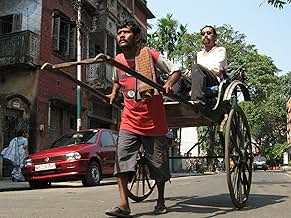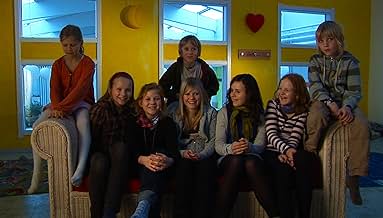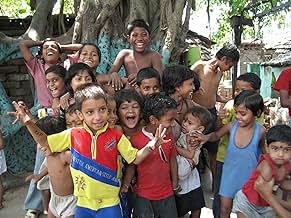PUNTUACIÓN EN IMDb
7,2/10
3,4 mil
TU PUNTUACIÓN
Añade un argumento en tu idiomaHappy takes us on a journey from the swamps of Louisiana to the slums of Kolkata in search of what really makes people happy.Happy takes us on a journey from the swamps of Louisiana to the slums of Kolkata in search of what really makes people happy.Happy takes us on a journey from the swamps of Louisiana to the slums of Kolkata in search of what really makes people happy.
Reseñas destacadas
Loved the topic but don't be fooled by the clear bias that just gets stronger and stronger with this movie. (Opinions are like derrieres, everyone has one) but to present this as a documentary and not own the fact that it promotes certain things and dismisses others is to lower it's credibility.
Here's my bias: Liberty is a moral imperative. -and it's not for the government to decide for people what will or will not make them happy because eventually, they will use their power to impose it on everyone. This is what is so wrong with Marxism, Socialism et al. The collective notion that if it's good for one person, it must be good for all. (That's a lie too, because it's usually only good for the people who are trying to subjugate and enslave others.) It takes a while for this movie to show it's bias but show it, it does: Religion, bad. Communes, good. And many more. For any film to ignore the matter of free will, individual choice and the ability to make those personal decisions about what one choosed to pursue and how he will spend his time, is to ignore an essential quality for happiness.
Not that part of this film weren't moving. The woman who surmounted getting run over by a car was incredibly moving, but the ingredients for happiness are not the same for everyone, yet this film has a collectivist bias. Being free enough to discover what is important in one's life is part of the joy of living. This movie may either intentionally or unintentionally promote the notion that the recipe is the same for everyone. Just do as I say!
Here's my bias: Liberty is a moral imperative. -and it's not for the government to decide for people what will or will not make them happy because eventually, they will use their power to impose it on everyone. This is what is so wrong with Marxism, Socialism et al. The collective notion that if it's good for one person, it must be good for all. (That's a lie too, because it's usually only good for the people who are trying to subjugate and enslave others.) It takes a while for this movie to show it's bias but show it, it does: Religion, bad. Communes, good. And many more. For any film to ignore the matter of free will, individual choice and the ability to make those personal decisions about what one choosed to pursue and how he will spend his time, is to ignore an essential quality for happiness.
Not that part of this film weren't moving. The woman who surmounted getting run over by a car was incredibly moving, but the ingredients for happiness are not the same for everyone, yet this film has a collectivist bias. Being free enough to discover what is important in one's life is part of the joy of living. This movie may either intentionally or unintentionally promote the notion that the recipe is the same for everyone. Just do as I say!
This is a movie where the subject matter is far more important than the quality of the movie itself (which is good). Had I received messages like this when I was young, I am sure I would have made fewer mistakes.
Young persons understand that happiness is a life goal but they are often confused among conflicting messages on how to get there. By illustrating those who have achieved happiness as well as those who have not, the movie could potentially be very useful in helping young people make responsible and fulfilling life choices.
So hopefully this little movie will be recognized as a motivational tool for the young and used in our classrooms and in other venues where teens might be receptive to its message.
Young persons understand that happiness is a life goal but they are often confused among conflicting messages on how to get there. By illustrating those who have achieved happiness as well as those who have not, the movie could potentially be very useful in helping young people make responsible and fulfilling life choices.
So hopefully this little movie will be recognized as a motivational tool for the young and used in our classrooms and in other venues where teens might be receptive to its message.
An excellent, thought provoking movie that will grab your attention and your heart. This should be required viewing for everyone. It is interesting and rewarding that Hollywood would produce for us a documentary on Happiness but at the same time has been a large contributor to trying to make us believe, falsely, what makes us happy. There is a well done piece also about what doesn't make kid's happy. It seems a shame that the producers found it necessary to search around the world to find happiness. My prayer is that it will abound and be readily evident in and around each one of us.
A great movie that will warm your heart, stir your soul and hopefully make you think about a practical application in your own life.
A great movie that will warm your heart, stir your soul and hopefully make you think about a practical application in your own life.
Yes, instead of Gross National Product, the tiny country of Bhutan, nestled in the eastern end of the Himalayas, focuses on Gross National Happiness. In direct contrast to a country like Japan, where workers under too much job-related stress to increase efficiency and minimize errors are dying way too young.
That in a way captures the focus of this film, "Happy." It examines the human characteristic of "happiness", what it really is, how one achieves it, and how it relates to our lives in total. The film is a good mixture of human examples in the real world, and researchers explaining their findings.
The very first person profiled is a very poor, rickshaw operator in India. But he is happy, because his home is sufficient, and when he gets home from work is greeted by his children. My favorite, because it relates to my own Cajun upbringing, is an extended Cajun family in Louisiana, not wealthy in material things, but enjoying a wealth of happiness from hard work, and sharing the day's seafood haul and enjoying the natural beauty of the waterways and the wildlife.
There are two important, but opposing forces, at work in most humans. One is the need to achieve a certain degree of success, wealth, beauty, and recognition. But this requires competition which in itself does NOT bring true happiness. The other force is to give back to the Earth and society, to have friends, to take care of the less fortunate, to be kind to others, to do good deed, to take time to play and laugh and have fun for no reason than to simply be happy.
It is this second type of force, which is cooperation rather than competition, that leads to better health, both mental and physical, and in general to longer lives. I can relate, I am retired from a career that required competition to get promotions and bigger pay increases. I was sufficiently successful at that to retire, debt-free, at 50.
But in retirement I am much happier, and I believe it is because I now refuse to compete, at anything, I don't gamble, and I play sports only for fun. I often volunteer to help others, even if it is to pause 15 seconds and help a stranger with loading their car with heavy groceries. It just seems like the right thing to do. Or simply greet a stranger with "Good day" and a smile.
The film makes the point, doing the things that make us happier may not take much effort at all, it is just being ourselves and reminding ourselves that being happy is simply an activity that needs to be practiced, just like anything we enjoy.
Good film, I wish everyone could see it.
That in a way captures the focus of this film, "Happy." It examines the human characteristic of "happiness", what it really is, how one achieves it, and how it relates to our lives in total. The film is a good mixture of human examples in the real world, and researchers explaining their findings.
The very first person profiled is a very poor, rickshaw operator in India. But he is happy, because his home is sufficient, and when he gets home from work is greeted by his children. My favorite, because it relates to my own Cajun upbringing, is an extended Cajun family in Louisiana, not wealthy in material things, but enjoying a wealth of happiness from hard work, and sharing the day's seafood haul and enjoying the natural beauty of the waterways and the wildlife.
There are two important, but opposing forces, at work in most humans. One is the need to achieve a certain degree of success, wealth, beauty, and recognition. But this requires competition which in itself does NOT bring true happiness. The other force is to give back to the Earth and society, to have friends, to take care of the less fortunate, to be kind to others, to do good deed, to take time to play and laugh and have fun for no reason than to simply be happy.
It is this second type of force, which is cooperation rather than competition, that leads to better health, both mental and physical, and in general to longer lives. I can relate, I am retired from a career that required competition to get promotions and bigger pay increases. I was sufficiently successful at that to retire, debt-free, at 50.
But in retirement I am much happier, and I believe it is because I now refuse to compete, at anything, I don't gamble, and I play sports only for fun. I often volunteer to help others, even if it is to pause 15 seconds and help a stranger with loading their car with heavy groceries. It just seems like the right thing to do. Or simply greet a stranger with "Good day" and a smile.
The film makes the point, doing the things that make us happier may not take much effort at all, it is just being ourselves and reminding ourselves that being happy is simply an activity that needs to be practiced, just like anything we enjoy.
Good film, I wish everyone could see it.
I'm going to leave out my overall feelings about this movie but WHY would you spend so much time interviewing people in Japan and then NOT INTERPRET IT! There is no close captioning or interpretation of what they are saying at all. That's a lot of wasted time and material.
¿Sabías que...?
- ConexionesFeatured in Zomergasten: Episodio #24.3 (2011)
- Banda sonoraRendezvous with Rama
Composed by Chris Conway
Performed by Baluji Shrivastav
© 1999. Used by permission of ARC Music (www.arcmusic.co.uk)
Selecciones populares
Inicia sesión para calificar y añadir a tu lista para recibir recomendaciones personalizadas
- How long is Happy?Con tecnología de Alexa
Detalles
- Fecha de lanzamiento
- País de origen
- Sitio oficial
- Idiomas
- Títulos en diferentes países
- Happier
- Localizaciones del rodaje
- Empresas productoras
- Ver más compañías en los créditos en IMDbPro
- Duración1 hora 16 minutos
- Color
- Relación de aspecto
- 1.78 : 1
Contribuir a esta página
Sugerir un cambio o añadir el contenido que falta

Principal laguna de datos
By what name was Happy (2012) officially released in India in English?
Responde

















